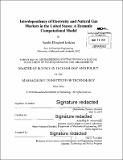Interdependency of electricity and natural gas markets in the United States : a dynamic computational model
Author(s)
Jenkins, Sandra Elizabeth
DownloadFull printable version (8.081Mb)
Other Contributors
Massachusetts Institute of Technology. Technology and Policy Program.
Advisor
Anuradha M. Annaswamy.
Terms of use
Metadata
Show full item recordAbstract
Due to high storage costs and limited storage availability, natural gas is generally used as a just-in- time resource that needs to be delivered as it is consumed. With the shale gas revolution, coal retirements and environmental regulations, the interdependency of natural gas and electricity has increased. These changes impact pipeline financing and power generation dispatch. Potential solutions to gas-electricity interdependency challenges such as mismatched market schedules are not too difficult to determine. However, a quantitative model is needed in order to evaluate these solutions in order to provide insights into which solutions to interdependency concerns offer the best outcomes. While it is clear that natural gas constraints will affect the cost of the electricity system, there is a need for modeling to explore the relationship between fuel uncertainty and system cost. In this thesis, a quantitative optimal flow model with a dynamic market mechanism is used to measure the effects of natural gas-fired power producer's fuel uncertainty on the net social benefit to consumers and producers. Modeling results indicate that fuel price uncertainty negatively affects social welfare while demand response, information availability and coordination improvements limit the impact of natural gas fuel uncertainty. To simulate improved coordination, a second model is developed which includes natural gas network constraints. The results of this model demonstrate how joint optimization of the networks could relax fuel constraints on gas-fired generators and improve social welfare.
Description
Thesis: S.M. in Technology and Policy, Massachusetts Institute of Technology, Engineering Systems Division, Technology and Policy Program, 2014. 81 Cataloged from PDF version of thesis. Includes bibliographical references (pages 73-81).
Date issued
2014Department
Massachusetts Institute of Technology. Engineering Systems Division; Technology and Policy ProgramPublisher
Massachusetts Institute of Technology
Keywords
Engineering Systems Division., Technology and Policy Program.